Table Of Contents
Tilers Place is reader-supported. When you buy through links on this page, I may earn an affiliate commission on qualifying purchases.
Why You Want To Avoid Using An Angle Grinder For Grout Removal
An angle grinder is the fastest tool for removing grout known to man – fact.
But that speed comes with many problems that you need to be aware of before you starting removing grout from your tiles. Read on and learn the hidden dangers of angle grinder grout removal.

Introduction To The Angle GrInder As A Grout Removal TOol
While an angle grinder is a great tool, its speed and learning curve does not make it best grout removal tool.
When you think of a grout removal tool, most people will automatically think of the angle grinder.
Simply attach a diamond blade to it and you’re away. Run the angle grinder straight along the grout line and boom you’re finished.
Grout removed!
Sure, it sounds all good and rosy and in the ideal world; the angle grinder works great as a grout removal tool. One thing it has on all other tools for removing grout is that it’s by far the quickest method of removing grout.
Sure, it sounds all good and rosy and in the ideal world; the angle grinder works great as a grout removal tool.
One thing it has on all other tools for removing grout is that it’s by far the quickest method of removing grout.
It is the best commercial grout removal tool as it rips through grout like no other power tool out there.
With a practiced hand you can remove grout from a tile in twenty seconds or less because compared to tile, grout is very soft and crumbles underneath the power of a diamond blade.
So the angle grinder is the fastest grout removing tool out there and that is where the advantages of an angle grinder used as a grout removal tool end.
Problems With The Angle Grinder
The reason the angle grinder is inferior to an oscillating multi-tool (like the DeWalt DCS355D1) with a grout removal blade is that it is so easy to ruin a tile or the substrate underneath.
If you don’t lock your arm securely and work with an extreme precision you will end up cutting into the tile you are removing grout from.
“Oh, it’s not that hard to cut straight, is it!?”
I know you’re thinking it and I bet you have never tried using a grinder as a tile grout removal tool.
An angle grinder spins at an average of 10,000rpms, it is also much heavier than a DeWalt oscillating multi-tool or any other for that matter.
That makes it harder to use and easier to misplace your cutting line. When your cutting through a soft material such as grout (in comparison to tile), it goes through it very quickly.
If you so much as move a hair off target you will end up cutting into the tile. You know how tiles look, any damage near the edges will be seen instantly.
If I did such damage in a client’s job I am legally liable to either fix that tile or even retile the whole entire floor if that tile isn’t available and my client decides to play hardball.
It happens, believe me.
My buddy nearly went bankrupt after he had to retile the whole entire floor area of a home, all because he slightly damaged a tile that wasn’t being made anymore.
Even if you are removing grout in your own home and end up damaging that tile, you will end up regretting it as you look at that damaged tile every day.
If the old damaged grout was enough of an eye-sore that it led you to removing it, then a damaged tile will be even worse.
Now imagine damaging a few tiles while removing that grout?
Real Life Example Of Tile Damage During Grout Removal
An angle grinder is so volatile as a grout removal tool I can honestly say nearly every job I saw a contractor remove grout with it, they messed up the tiles.
The contractor cut into two tiles trying to remove one. These cuts cannot be hidden with grout, they are there forever. Look at the glaze totally chipped off one.
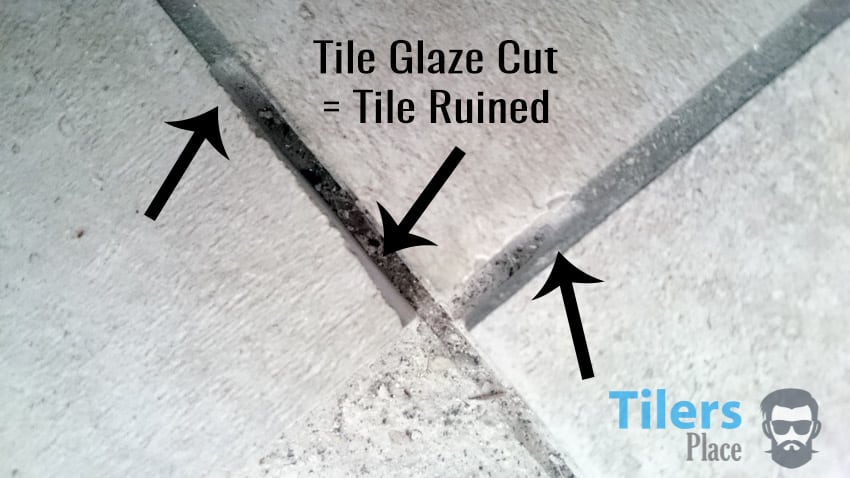
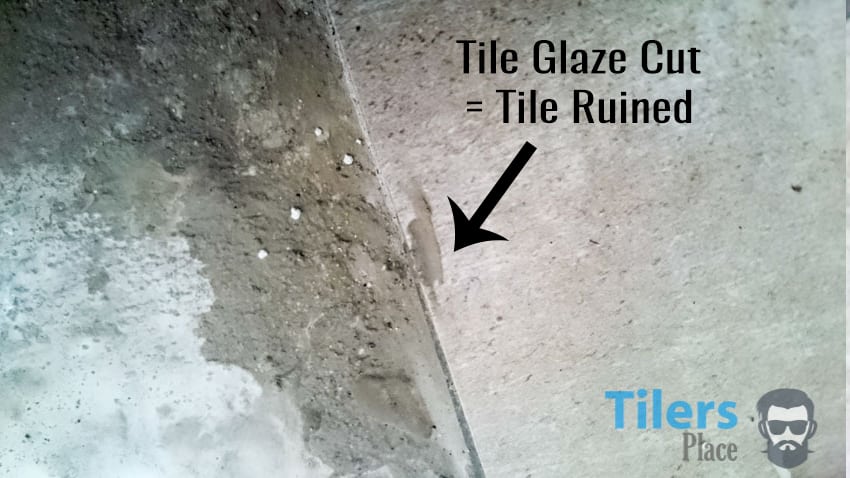
Here the contractor cut right into the tile as they missed the grout line. This is unacceptable in ANY circumstances.
We are talking about professionals here, people that use these tools every day and know how they behave.
If they can damage a tile so easily I believe it helps prove my point that you should avoid using an angle grinder to remove grout.
Of course, there are more reasons why they are not the best tools for removing grout.
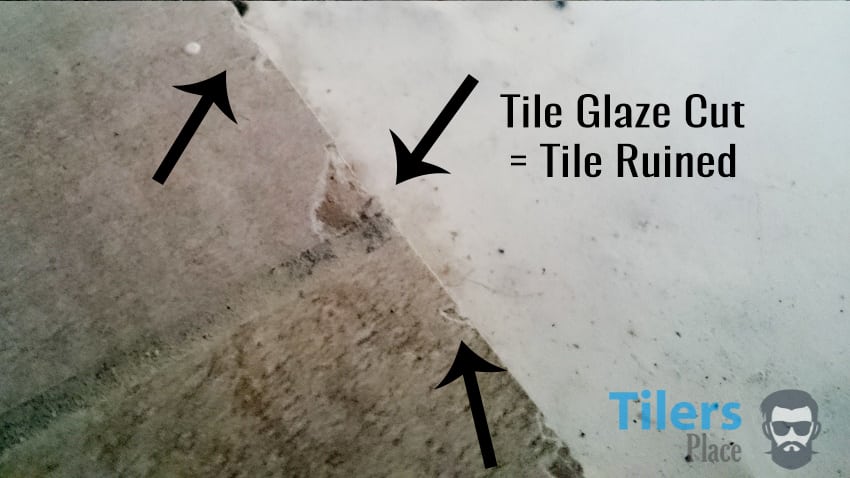
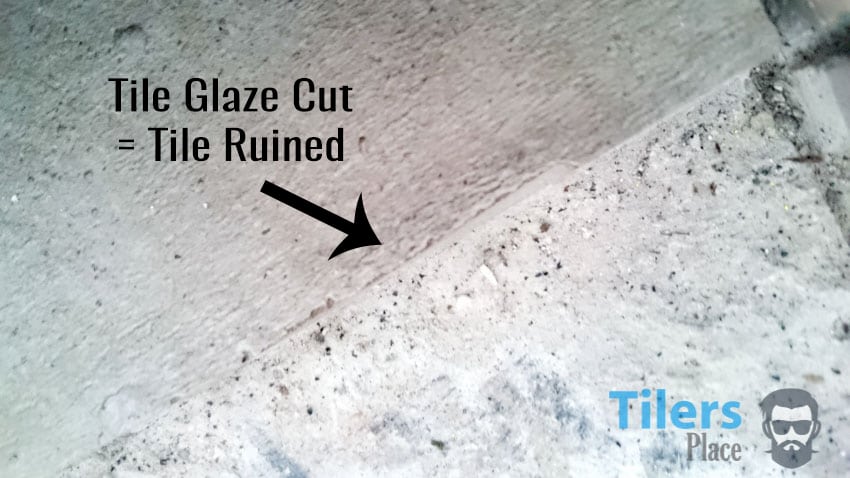
Small Tiles Are Difficult To Remove Grout From
Imagine removing grout in small 4 inch (10cm) tiles where there are plenty of intersecting grout lines.
You’ll end up accidentally cutting into a neighbouring tile while you’re removing the grout.
How about mosaic tile?
Removing grout from those is a lengthy enterprise no matter which grout removal tool you use, with an angle grinder you are better off just tearing it all out and starting over.
As bad as all these cases sound, there is one point which is by far the worst and what makes the angle grinder downright disastrous in the wrong hands.
The Real Danger Of Using An Angle Grinder As A Grout Removal Tool
An angle grinder has no depth perception, at least at the depths your working with, cutting a quarter inch deeper is only a millisecond away.
Now you cut through the grout and keep going, without realizing it you will cut into whatever is beneath. If you’re working on a concrete substrate that’s fine, you won’t damage anything just cut into the concrete underneath.
Now, what if you’re working in a bathroom, with a waterproofing membrane and even underfloor heating? In a split second, you can cut into those thus destroying their integrity.
For waterproofing that means a leak where it will end up going everywhere and eventually rotting away your floor or walls.
We all know someone with a nightmare that occurred due to water leaking somewhere, usually from a bathroom. For underfloor heating, it means a cable is cut and your heating won’t work anymore.
Either scenario results in removing the whole entire tile installation and reapplying whatever has been damaged. Then retiling the area again.
Spending a couple thousand dollars for a small grout removal job?…not worth it!
Are you scared yet?
Hopefully not, I am not trying to impose the homeowner’s apocalypse into your mind here. I just want you to be aware of what can happen when you turn that grinder into a grout remover and go ham on your grout.

The Best And Safest Tool For Grout Removal
My recommended grout removal tool is an oscillating multi-tool with a grout removal blade attached.
My particular favorite is the DeWalt DCS355D1. It’s cordless, has excellent ergonomics and the variable speed trigger makes it a breeze to use.
An oscillating multi-tool will make it very apparent when you have removed all the grout, giving you plenty of time to pull the blade out.
It will take a conscious effort to cut into the substrate.
Besides that, the DeWalt will not buck or kick or tear into your tile if you even so much as blink too long and go off course.
It also offers you the advantage of instantly stopping the tool with it’s trigger on/off system. You squeeze the multi-speed trigger to power it on and all power stops if you release the trigger.
So if you run into trouble or drop the tool accidentally, it will turn off before it causes any damage to you or the material around you.
An angle grinder has a locking on/off switch on top of the power tool and will still keep going if you drop it and that diamond blade will keep spinning a good ten seconds when you shut it off anyway.
It’s a dangerous tool if used inappropriately and so it’s use as a removing grout tool for home handymen or home flippers isn’t recommended.
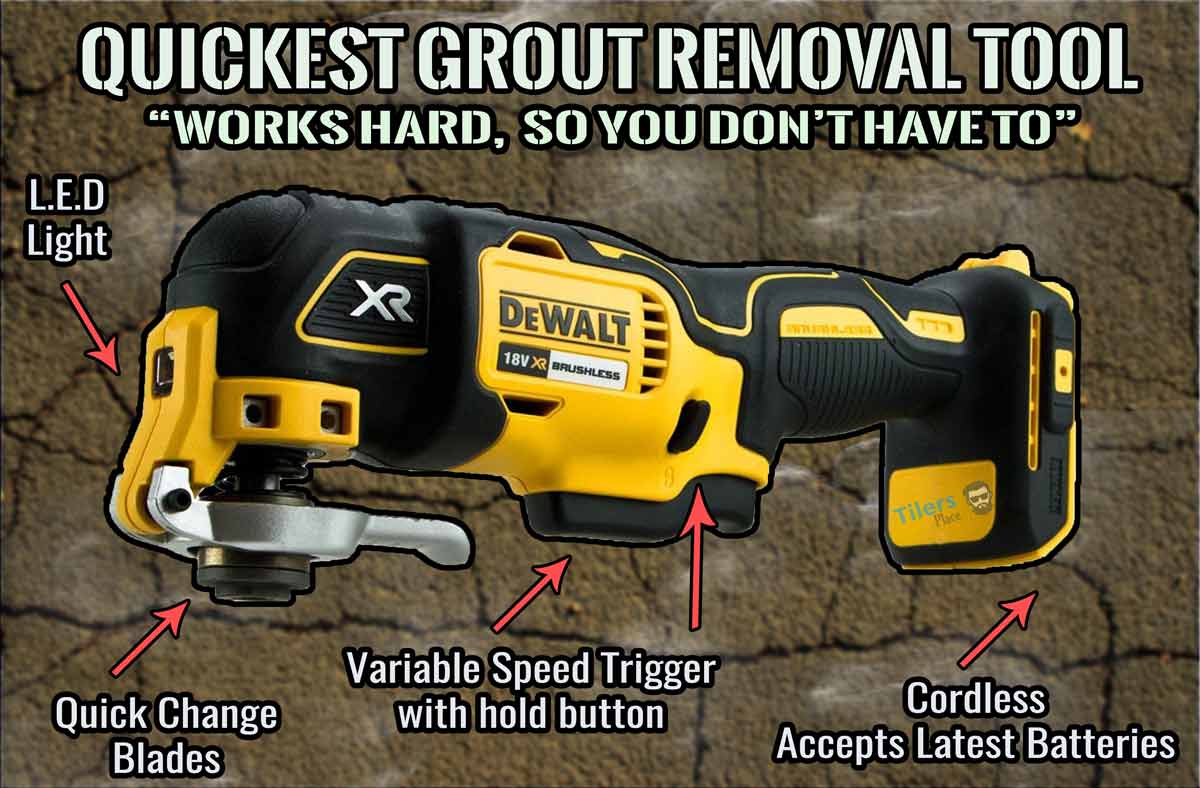
Conclusion
Hopefully, this has given you insight into the grinder as a grout removal tool. It can seem like the easiest option for removing grout but take a second to think about it and the flaws begin to show.
Before the multi-tool was invented I used angle grinders to remove grout, I even used my Hitachi tile saw.
Every time I used it I held my breath and locked my arm into a terminator like grip and hoped I won’t be eating tinned beans for years because I had to retile everything after I damaged a tile.
Thankfully I took my time and didn’t end up in that situation, however, my beard began greying prematurely thanks to the stress. When I discovered the oscillating multi-tool with grout removal blade I switched to that and never looked back.
I believe if you purchase a DeWalt Mult-tool with a grout removal blade you won’t either, it simply is the safest and best grout removal tool out there period.

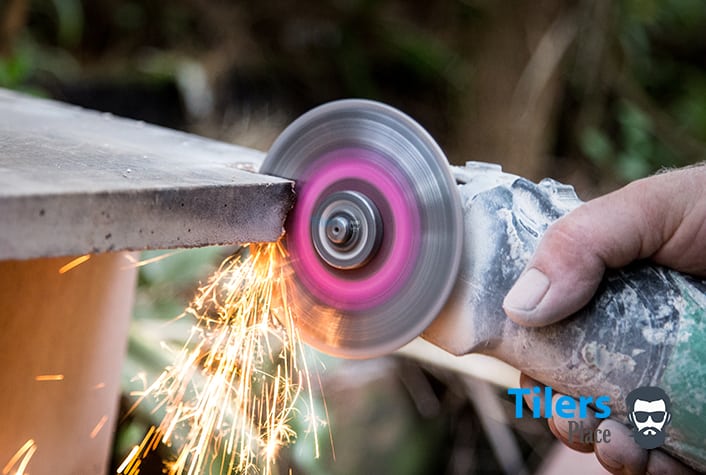




you described the situation very well. and have saved me from the stress and incipient gray hairs from the arm locking crouch position I was ill considering. If I won’t listen to a tile man on this subject there’s no helping me.
thanks for your thoroughly convincing advice.
now I will buy that damn grout removal tool.
regards
Hey buddy, I appreciate you taking the time to consider my advice and see the merits. Every job that involved a grinder for removing grout never resulted in good results. I’ve seen plenty and know it ain’t as easy as it looks! The multi-tool may seem like a more expensive option but it’s the best option in the long run and it’s the only thing I use for such work (well over 10 years now.)
Thanks again for visiting and all the best with your project. Stay safe out there!
I actually purchased, an angle grinder, however, after turning it on and observing it; I thought better check this out more. I was so glad when i bumped into your article. Whew, taking angle grinder back and purchasing the tool you suggested! Thanks so much, you made a lot of sense.
Hi Robert, good on you for researching more before committing! Especially if it was your first time ever using an angle grinder. They are wild beasts even in experienced hands. All the best with your project.
I was about to get to use my neighbour angle grinder he has let me borrow, it doesnt have a handle so would probably be harder to control. After reading this the only option is to get a multi tool – great advice and well written, thanks!
Hi Pritesh,
Thanks for letting me know the article helped. I’m pleased I helped you avoid a mistake. All the best with your project and a big thumbs up for doing your research before undertaking a new project.
Thanks for your post, Interesting, I removed my grout and then refilled the lines with new grout.
Problem is I now have some hardended grout on my tile and can’t get it off. I tried acid, wire brush, salt water – it’s like cement!
Any idea how to use a removal tool to take it off without damaging the tile? Thanks
Hi Jim,
I hate to say it but it looks like you messed up. The excess grout should have been washed off with a sponge and water during the grouting stage. Grout is basically a cement and behaves as such. You’ll need stronger methods, like a spatula to delicately ease the grout off the tile. Slide it along the edge and tap it.